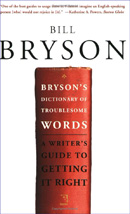Books |
Bryson’s Dictionary of Troublesome Words: A Writer’s Guide to Getting It Right
Bill Bryson
By
Published: Apr 17, 2023
Category:
Non Fiction
Bill Bryson is a writer who can do anything. A Walk in the Woods is the sidesplitting adventure of Bryson and his out-of-shape pal Katz as they walk the Appalachian Trail. He can be authoritative: A Short History of Nearly Everything lives up to the promise of the title. And is there a memoir more laugh-out-loud than The Life and Times of the Thunderbolt Kid?
When Bryson wrote his dictionary, he was a pup, an unknown writer toiling as a copyeditor at the London Times. Two decades later, he revised the book — he says it’s 60% new. Nice, but that’s not the reason you want it.
The sad fact is, our language is daily debased. And fight it though we may, lovers of correct usage wage a lonely — and losing — battle. Still, it is important to know when we are right. And, also, it’s nice to win arguments with the linguistically challenged.
That Bryson’s book is fun is built into concept — take troublesome words, give examples of their mauling, then suggest the correct use. [I was particularly taken by this approach, as I had recently written a piece in the same vein: “Hopefully… Not,” a writing guide for my daughter and a list of usage and grammar errors for adults. I was delighted to see that “hopefully” makes Bryson crazy too.]
He gets right to it: “Admit to” is nearly always wrong, he says. “You admit a misdeed, you do not admit to it.”
Can you begin a sentence with “and”? Bryson: “The belief that ‘and’ should not be used to begin a sentence is without foundation. And that’s all there is to it.”
Basically: “The trouble with this word, basically, is that it is almost always unnecessary.”
Did you know a “bon vivant” is not someone who lives well? A bon vivant likes good food. Someone who likes living well is a bon viveur.
You cannot be married and celibate. If you are married and don’t have sex, you’re chaste.
A boat sailing “nine knots an hour” — do you know what’s wrong with that? “Imply” and “infer” — but you know the difference, yes? “Sentences that begin with ‘it’ are almost always worth a second look” — can you guess why?
“Plan ahead.” As Bryson asks, “Would you plan behind?”
There’s lots more. And most of it is not only fun to read, it sharpens your sense of good writing and speech — this book literally wakes you up.
I’d give this book to the know-it-all English honors student, the crossword addict, the Scrabble devotee. And I’d get one for myself, just because.
To buy ” Bryson’s Dictionary of Troublesome Words” from Amazon.com, click here.


